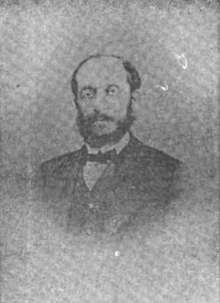Fransis Marrash
Fransis bin Fathallah bin Nasrallah Marrasch ( Arabic فرنسيس بن فتح الله بن نصر الله مرّاش, DMG Fransīs b. Fatḥ Allaah b. Naṣr Allāh Marrāš , called Fransis al-Marrasch or Fransis Marrasch al-Halabi ; born 1835 or 1836 or 1837 in Aleppo ; died 1873 or 1874 in Aleppo) was a Syrian writer and poet during the Nahda movement.
Life
Fransis Marrasch was born in Aleppo ( Ottoman Syria ) in 1836 into an old and respected Melkite family who were known for their literary interests. His father, Fathallah Marrasch, had created a huge private library that helped him raise his three children, Fransis, Abdallah and Marjana . All three children became writers.
Aleppo formed an important literary and philosophical center of the Ottoman Empire, with many thinkers and writers grappling with the future of the Arabs. Marrasch's children went to French schools, where they learned French, English and Italian. Fransis acquired knowledge of the Arabic language and literature as an autodidact . For four years he received private training in medicine from an English doctor and then practiced as a doctor for a year.
Fransis also devoted himself to the education of his sister Marjana. His father Fathallah and brother Abdallah achieved some literary fame, while Marjana brought the tradition of literary salons back to the Middle East. She was the first woman to write articles in the Arab press.
Due to an illness in his childhood, he had poor eyesight all his life and became completely blind at an advanced age, so that he had to dictate his texts.
Works
Books
- Dalīl al-ḥuriyyah al-insāniyyah , 1861.
- Al-mirʾāt al-ṣafiyyah fī al-mābādiʾ al-ṭabīʿiyyah , 1861.
- Taʿziyyat al-makrūb wa-rāḥat al-matʿūb , 1864.
- Ġābat al-ḥaqq fī tafṣīl al-aḫlāq al-fāḍilah circa 1865.
- Riḥlat Bārīs , 1867.
- Kitāb dalīl al-ṭabīʿah , circa 1867.
- Al-kunūz al-faniyyah fī al-rumūz al-Maymūniyyah , 1870 (poem with almost 500 verses).
- Mašhad al-aḥwāl , 1870.
- Durr al-ṣadaf fī ġarāʾib al-ṣudaf , 1872.
- Mirʾāt al-ḥasnāʾ , 1872.
- Shahādat al-ṭabīʿah fī wuǧūd Alāh wa-al-šarīʿah , 1892 (posthumous).
items
- "Al-marʾah bayna al-ḫušūnah wa-al-tamaddun", al-Ğinān , 1872.
- "Fī taʿlīm al-marʾah", al-Ğinān , 1872.
Web links
Individual evidence
- ↑ Al-Himsi, Udabāʾ Ḥalab ḏawū al-ʾaṯar fī al-qarn at-tāsiʿ ʿašar .
- ↑ Zaidan , Tarāǧim mašāhīr aš-šarq fī al-qarn at-tāsiʿi ʿašar .
- ↑ Halevi and Zachs, Gendering Culture in Greater Syria: Intellectuals and Ideology in the Late Ottoman Period , p. 24.
- ↑ Zaidan, Tarāǧim mašāhīr aš-šarq fī al-qarn at-tāsiʿi ʿašar ; Halevi and Zachs, Gendering Culture in Greater Syria: Intellectuals and Ideology in the Late Ottoman Period , p. 24.
- ↑ Al-Himsi, Udabāʾ Ḥalab ḏawū al-ʾaṯar fī al-qarn at-tāsiʿ ʿašar .
- ↑ Wielandt (1992), “Fransis Fathallah Marrasch's approach to the ideas of the Enlightenment and the French Revolution”, p. 119; Zeidan (1995), Arab Women Novelists: the Formative Years and Beyond , p. 50.
- ^ Zeidan (1995), Arab Women Novelists: the Formative Years and Beyond , p. 50; Wielandt (1992), “Fransis Fathallah Marrasch's approach to the ideas of the Enlightenment and the French Revolution”, p. 122.
- ↑ a b c d e f g Encyclopaedia of Islam , p. 599.
- ↑ Encyclopaedia of Islam , p. 599; Wielandt, p. 124.
- ↑ Al-Azmeh (2009), Islams and modernities , p. 120.
- ↑ Encyclopaedia of Islam , p. 599; Moreh, Modern Arabic Poetry 1800-1970: the Development of its Forms and Themes under the Influence of Western Literature , p. 44; Wielandt, “Fransis Fathallah Marrash's Approach to Enlightenment and the French Revolution”, p. 135.
- ↑ Encyclopaedia of Islam , p. 599; Moreh, Studies in Modern Arabic Prose and Poetry , p. 96.
| personal data | |
|---|---|
| SURNAME | Marrasch, Fransis |
| ALTERNATIVE NAMES | Marrasch, Fransis bin Fathallah bin Nasrallah bin Butrus; al-Halabi; فرنسيس بن فتح الله بن نصرالله بن بطرس مراش (Arabic) |
| BRIEF DESCRIPTION | Syrian writer and poet |
| DATE OF BIRTH | 1835 or 1836 or 1837 |
| PLACE OF BIRTH | Aleppo |
| DATE OF DEATH | 1873 or 1874 |
| Place of death | Aleppo |



